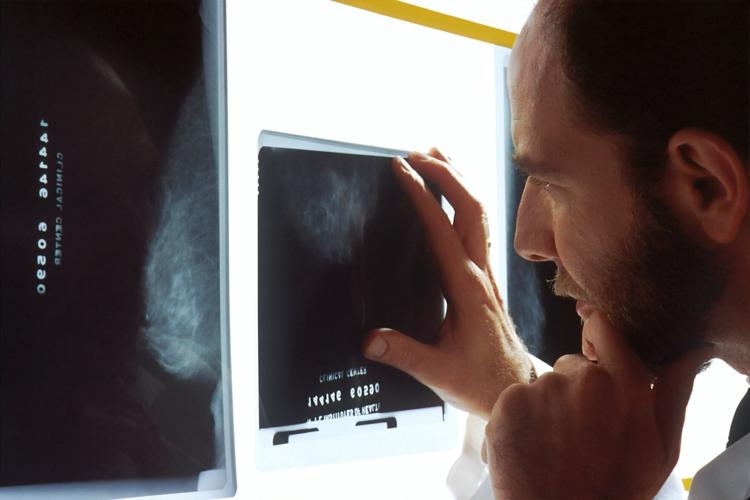
National Cancer Institute
By Stephen Beech
Men with advanced prostate cancer have been offered fresh hope thanks to a "promising" new drug combination.
It could "significantly delay" the progression of a deadly form of the disease in patients with specific genetic mutations, say scientists.
A major international trial, led by researchers from University College London (UCL), tested the addition of niraparib, a type of targeted cancer drug known as a PARP inhibitor, to the standard hormone therapy treatment of abiraterone acetate and prednisone, known as AAP.
The study focused on patients diagnosed with advanced prostate cancer where cells have spread to other parts of the body, who were starting their first treatment and who also had alterations in genes involved in an essential type of DNA defect repair, known as homologous recombination repair (HRR).
Scientists explained that those genes help repair damaged DNA and when they are faulty, cancer cells can grow and spread more aggressively.
Around one in four people with advanced prostate cancer at this stage have alterations in HRR genes, such as BRCA1, BRCA2, CHEK2, and PALB2.
The standard treatment for advanced prostate cancer is currently AAP or similar drugs, but the mutations make the cancer more aggressive and consequently disease progression on standard treatment is often far quicker with shorter life expectancies.

(Photo by Kampus Production via Pexels)
An estimated 1.5 million men are diagnosed with prostate cancer worldwide each year, and it is the most common cancer in men in the UK, with more than 56,000 diagnosed every year, and around 12,000 annual deaths from the disease.
The new trial involved 696 men across 32 countries with an average age of 68.
Half received the new combination therapy of niraparib plus APP, while the other half received standard treatment with a placebo.
Of all the patients, more than half (55.6%) had alterations in the BRCA1 or BRCA2 genes.
The trial was "double-blind" - meaning neither patients nor doctors knew which treatment was being administered.
The findings, published in the journal Nature Medicine, showed that, after an average follow-up period of 30.8 months, overall, niraparib reduced the risk of cancer growth by 37% compared to AAP alone in all patients and by 48% in the subgroup of patients with BRCA1 or BRCA2 mutations.
The time until symptoms got worse was twice as long for patients who received niraparib compared to those who received a placebo, reducing the number of patients who had notable worsening in symptoms from 34% to 16%.
The research team observed a trend toward improved overall survival in the niraparib group.
But they say a longer follow-up period is needed to confirm that niraparib improves life expectancy.

(Photo by Vlada Karpovich via Pexels)
Study leader Professor Gerhardt Attard, of UCL Cancer Institute, said: "Although current standard treatments are very effective for the majority of patients with advanced prostate cancer, a small but very significant proportion of patients have limited benefit.
"We now know that prostate cancers with alterations in HRR genes account for a significant group of patients whose disease recurs quickly and has an aggressive course.
"By combining with niraparib we can delay the cancer returning and hopefully significantly prolonging life expectancy."
He added: “These findings are striking because they support widespread genomic testing at diagnosis with use of a targeted treatment for patients who stand to derive the greatest benefit.
“For cancers with a mutation in one of the eligible HRR genes, where niraparib has been approved, a doctor should consider a discussion that balances the risks of side effects against the clear benefit to delaying disease growth and worsening symptoms.”
While the treatment was generally well tolerated, Attard said side effects were more common in the niraparib group.
Significantly more cases of anaemia and high blood pressure were reported with niraparib, and 25% of patients required blood transfusions.
Treatment-related deaths were also higher in the niraparib group with 14 compared to seven, although overall discontinuation rates remained low.
The team said that while the results are "promising" further research is needed to confirm long-term survival benefits and to analyze the impact of newer imaging techniques and broader genetic testing.























(0) comments
Welcome to the discussion.
Log In
Keep it Clean. Please avoid obscene, vulgar, lewd, racist or sexually-oriented language.
PLEASE TURN OFF YOUR CAPS LOCK.
Don't Threaten. Threats of harming another person will not be tolerated.
Be Truthful. Don't knowingly lie about anyone or anything.
Be Nice. No racism, sexism or any sort of -ism that is degrading to another person.
Be Proactive. Use the 'Report' link on each comment to let us know of abusive posts.
Share with Us. We'd love to hear eyewitness accounts, the history behind an article.